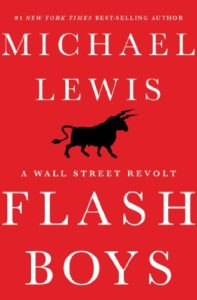Modern crime has become a lot more sophisticated. Back in the day, as my grandfather liked to point out, Jesse James used a gun to rob people. Today, in the age of computers and the internet, people hide behind terminals and sophisticated algorithms that do their dirty work for them. It also allows them to steal on a much larger scale.
In Flash Boys: A Wall Street Revolt, author Michael Lewis exposes how money was stolen from both sophisticated and average investors shortly after the economic collapse of 2008. That crimes were committed and money stolen is not all that shocking. Bad actors are everywhere, and Wall Street is no exception. What’s shocking is who the bad actors were in this case. They were the investment firms, trading firms, and big, household name banks that we trust to do the right thing with our money.
After the market collapse and subsequent volatility through 2008 and 2009, the SEC put regulation in place that allowed investment firms to setup their own private exchanges. The primary exchanges at the time, the NYSE and NASDAQ, were viewed as opaque black boxes. They were also single points of failure where investors could get trapped if the exchanges’ computer systems failed. The new regulations were meant to make markets more transparent and to reduce the risk of market failure, or so the thinking went.
Instead, the regulations had the opposite effect, at least when it came to information available to investors outside of Wall Street. The insiders figured out how to manipulate the private market exchanges through high frequency trading. The details are arcane and complex, and in spite of Lewis’ excellent explanation, I found it hard to understand. The bottom line is that the investors figured out how to gain an advantage of a penny or two on the price of each stock transaction, without assuming any risk or having to hold any of the underlying securities.
While a penny or two per transaction may not seem like much, it adds up quickly when millions of shares are trading hands. Being that billions of shares are traded each day, a one penny difference on a billion shares equates to $10,000,000 dollars that could be siphoned out of the market each day. That equates to $2,500,000,000 over a year, assuming 250 trading days, and these are conservative estimates. Daily trading volumes are typically 10x this amount, and the price advantages gained on some trades drifted as high as 5-10 cents per share. It doesn’t take much to see that the stakes were high for those involved with potential billions to be made.
In Flash Boys, Lewis reveals how the insiders used computer algorithms and preferred access to markets through high speed fiber optic connections to carry out their activities. When a small group of traders on Wall Street figured out what is going on, they set out to create an alternate exchange to negate the advantage and reform the market. Lewis weaves a story based on actual events that shows the challenges the group faced, how they achieved their objective, and the fallout that occurred once the high frequency trading practices were exposed.
I liked Flash Boys. While it may not have been as good as some other Lewis books I’ve read such as The Blind Side and The Big Short, I still found it to be both entertaining and interesting. My only nits are the way he jumped around in time, which made events hard to follow, and that he didn’t go into detail about how the malevolent players were pursued and punished. He touches briefly on the latter, but since the investigations were on-going while the book was published, he wasn’t able to include the final findings.
Because of the technical nature of Flash Boys, I wouldn’t necessarily recommend it for everyone. It’s a great read if you are into investing and have a strong interest in what happens behind the scenes on Wall Street. It can be a little unsettling and downright scary as well, and it may confirm your worst fears. On the other hand, if you don’t have strong interest in the stock market, I’d recommend picking up one of Lewis’ other works. He’s a great writer, and there are a lot of options to choose from.


Pingback: My 2020 reading list - Gregg Borodaty